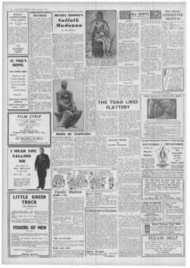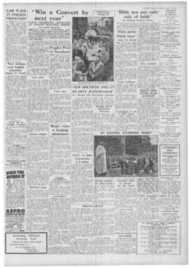Page 6, 25th August 1950
Page 6

Report an error
Noticed an error on this page?If you've noticed an error in this article please click here to report it.
Tags
Share
Related articles
Disney Surprise
Earth And Ourselves
Magic Is Missing T En Year Old M Ichael Rocked In His
Laughing Tortoise
- Ea Ten Sir Roy Shaw Philip Larkin Is The Most Popular
THE TOAD LIKES FLATTERY
ONE hot evening about this time last year we found, seated on the sun-baked step of our back door, a large, sombre-looking toad. His air was so entirely purposeful, and the place he had chosen so de void of all the amenities that one normally associates with toads, that we decided that he must. quite deliberately, be seeking human aid. Water, in that season of drought, was his obvious need, so I hollowed out a round of earth, set a tin plate in this, and filled it with water. Immediately he crawled over the edge of the plate, lowered his chin, front legs and the upper half of his body into it, and wallowed luxuriously. After some time he lurched off into the shade of the mint bed and presently disappeared. We did not see him again. But the incident. I feel, is worth recording.
What brought the creature down a cinder path and along at least 8 ft. of hot brick paving. to a closed door, unless some instinct told him that behind that door were other crea tures that might possibly help him ?
This was, I felt sure. the same toad that had been found some weeks.
previously under a clod of earth in a neglected flower-bed. He had sat there, under his canopy, smiling.
We talked to him, and he blinked. F stroked his head. and his smile (I fondly imagined) grew broader. I caught some ants and offered them
NATURE NOTES
by JULIAN HOLROYD
to him. Never could I have imagined a meal taken with such imperturbable dexterity. An ant was put to run in front of him: the wide mouth opened and, quicker than human eye could follow. the tongue darted out and in and the mouth snapped to again, while the rest of the toad remained immovable.
Throughout that sunny afternoon I laboured to feed my friend: flies and ants were not difficult to find. but the former were not easy to
transport alive. Dead, 1 knew, he would disdain them.
Other members of the household joined in, and our toad sat in kindly state. accepting our gifts with a smile. Then (and this I found inexplicable) a neighbour. a keen naturalist, came to call. We took her to see our visitor.
She knelt down, as vve had been doing at intervals all through the afternoon, to look at and talk to hint, but with one lurch he heaved the clod of earth from his back, turned, and crawled into the nearby undergrowth. And except when he called for a driok some weeks later, we have not seen him since. This summer I have searched the garden for him in vain.
THE toad has come in for a great deal of undeserved
abuse. It has been called filthy because of its habit of exuding an unpleasant fluid when alarmed or attacked. But the poor, slowmoving creature must, after all, have some form of defence against the many forms of animaland bird-life that would otherwise prey on it.
Apart from this, the toad itself is a most cleanly creature, always choosing clean earth or decent compost for its places of meditation, eating live animals and never decaying flesh, and attending frequently to its toilet, wiping its face and head with its hands in a thoroughly systematic way.
It is a creature that repays observation. It is very intelligent, and some people maintain that it shows clear evidence of gratitude, following about a garden those who have given it first-aid in one of the many accidents to which. by its sedentary life, it lays itself open.
It is also easily tamed by those who exercise sufficient patience. Gilbert White, quoting what he assures us is undoubted authority. writes: "Some ladies (you will say of a peculiar taste) took a fancy • to a toad, which they nourished summer after summer for many years, till be grew to a monstrous size, with the maggots which turn to flesh flies. The reptile used to come forth every evening from an hole under the garden steps, and was taken up after supper, on the table. to be fed."
THE toad is a solitary creature. Except at the mating season it is rarely that one finds him in company with any of his own kind. And yet he is so friendly, so susceptible to the flattery of the human voice. Talk to him in caressing tones and he will listen to you (if you can keep it up) by the hour.
Scratch him gently on the top of the head and he will blink eternal friendship at you. But frighten him, and—instead of leaping away as the frog will do—he will rise to his full height and get his poison sacs working. And who can refuse him respect for this ?
Frogs may be full of charm, but it is toads that have character. If one chooses to live in your garden you may—provided that no accident occurs to shorten his life—count on a long and pleasant friendship, for the toad (once again unlike the frog) can live some 20 to 30 years, and that. with his marked partiality for the garden of his choice, will mean that if you treat him well he will do the same by you. and rid your flowerbeds of more injurious insects in one summer than you could count in the proverbial month of Sundays.
blog comments powered by Disqus









